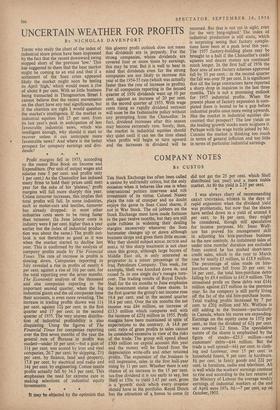COMPANY NOTES
BY CUSTOS THE Stock Exchange has often been called a casino by unfriendly critics, but the only occasion when it behaves like one is when international politics intervene and rob investment of its virtue. Colonel Nasser plays the role of croupier and no doubt enjoys the game in Suez Canal shares, if not in War Stock. The oil jobbers on the Stock Exchange must have made fortunes in the past twelve months, but they are still quite ruthless in widening their dealing margins excessively whenever the Suez barometer changes up or down although business drops and gives them little excuse. Why they should subject ROYAL DUTCH and SHELL to this sharp treatment is not clear since this group, although large buyers of Middle East oil, is only interested as proprietor in a minor percentage of the Iraq Petroleum Company. This week, for example, Shell was knocked down 4s. and raised 5s. in one single day's meagre turn- over. The trading results of Royal Dutch- Shell for the six months to June emphasise the investment status of these shares. In the first quarter the group's net income rose 19.4 per cent. and in the second quarter 18.4 per cent. Over the six months the net income was £84 million, an increase of £13.3 million which compares well with the increase of £.254 million in 1955. Profit margins have been maintained in spite of expectations to the contrary. A 14.8 per cent. ratio of gross profits to sales cannot be considered excessive in view of the risks of the trade. The group will spend about £300 million on capital account this year and the money will be found from the depreciation write-offs and other retained profits. The expansion of the business is still impressive, sales in the first half-year rising by 11 per cent. Whether there is any chance of an increase in the 15 per cent. tax-free dividend it is too early to say, but Shell at 150s. to yield 3.45 per cent. gross is a 'growth' stock which every investor should have in his portfolio. Royal Dutch has the attraction of a, bonus to come (it
did not get the 25 per cent. which Shell distributed last year) and a more stable market. At 80 the yield is 2.35 per cent. • • •
I was always chary of recommending GREAT UNIVERSAL STORES in the days of rapid expansion when the dividend yield was problematic, but now that the shares have settled down to a yield of around 8 per cent. to 84 per cent. they might be considered, though still speculative for income purposes. Mr. Isaac Wolf- son has proved his management skill in adjusting his hire-purchase business to the new controls. As instalment sales of under nine months' duration are excluded from control he has pushed short-term credit sales, which in the year to March rose by nearly £5 million, to £18.9 million. The percentage of sales made on hire- purchase terms fell from 20 per cent. to 14 per cent., the total hire-purchase debts falling by £9.4 million to £41.9 million. The unrealised profit on these debts was £144 million against £17 million in the previous year. So .the company is still partly living off the fat of the old hire-purchase boom. Total trading profits increased by 7 per cent. to £204 million and Mr. Wolfson is still adding to the business—particularly in Canada, where his stores are expanding. Earnings on the equity came to 1371 per cent., so that the dividend of 621 per cent. was covered 2.2 times. The speculative nature of the shares is emphasised by the figure of stocks—£25.3 million—and customers' debts—£44 million. But the trade is well spread-44/ per cent. in cloth- ing and footwear, over 15 per cent. in household linens, 9 per cent. in hardware, 84 per cent. in fancy goods and 224 per cent. in furniture, radio and television. All is well while the workers' earnings continue to rise and according to the last returns of the Ministry of Labour the average weekly earnings of industrial workers at the end of April were 197s. 9d.--7 per cent. up on October, 1955.


































 Previous page
Previous page